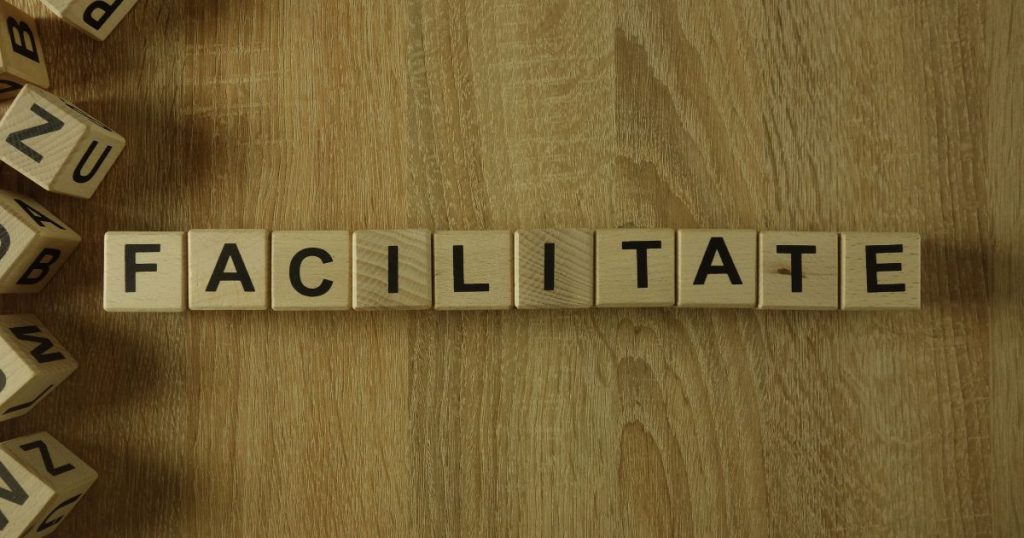What is facilitation and the role of a facilitator? A facilitator’s role is to create a suitable environment for group processes to thrive and also to empower a group to reach their conclusion by focussing on the outcome(s) and involving the participants.
The central aim of facilitation is to help a group reach a goal or decision. In order for a group to reach their goal or decision it is frequently necessary for a facilitator to be present and they are often someone external to the situation or impartial to the decision that is being made. This impartiality aspect is incredibly important as it encourages mutual respect between the participants and the facilitator right from the start of the process. The facilitator must build and maintain mutual respect and remain neutral.
A facilitator also provides structure to a meeting or situation but without controlling it. An example of when this aspect of facilitation is needed is when a discussion goes off-topic and the facilitator is there to keep them on task.
Questioning is a crucial element to the role of a facilitator, the facilitator may employ different questioning techniques depending on the situation. Questioning is a vital tool that encourages people to participate so the types of questions asked need to fit the context.
Contents
Facilitators build consensus
Consensus building is a process used in facilitation and group-decision making that requires agreement or consent from all participants. If all participants are in agreement and all hold similar views relating to a decision then the facilitator would not need to use a consensus building technique.
However if a decision needs to be made but there are differing viewpoints being brought forward by participants, which could range from a slight difference in opinion to strongly opposing beliefs, then the facilitator can use a technique to enable the participants to reach a consensus.
A facilitator should have a range of consensus building methods and techniques in their toolbox which should be used appropriately according to the aims of the session, the importance of the issue being discussed/decision being made and the level of agreement that is required by the group.
Organisation & Planning
An effective facilitator should have excellent organisational skills. This is important for time management during a session; part of the facilitator’s role is to keep the meeting on track to ensure that every item the agenda can be discussed to meet the aim(s) or goal(s) of the meeting.
Facilitators also need to plan ahead for their sessions, they need to create session plans to help things run smoothly, decide what techniques they will use and gather some background information if necessary. It is also important for the facilitator to be flexible and adaptable as matters arise during the session, such as participants cancelling at the last minute, extra people attending who weren’t expected or a participant acting disruptive.
The facilitator should plan ahead for these eventualities by preparing a range of different participative methods which are suitable for varying group sizes and be allowing for some flexibility when writing the session plan.
Active Listening
A good facilitator has good listening skills, during discussions or debates it is common for people to not give their full attention to what someone is saying as their thoughts are spent formulating a response or thinking about what to say next. A facilitator needs to actively listen to what participants are saying and focus on their words, not their own thoughts.
The facilitator can use open body language and visual cues to show that they are listening to someone, such as regular eye contact and nodding their head. Whilst it is important for the facilitator to be conscious of their own body language they should always remain focussed on what the participant is saying.
Facilitators are Communicators
As well as active listening skills, an effective facilitator should have good verbal communication skills. When the facilitator is speaking their delivery should be clear and concise, they should not embellish words with lots of jargon or phrases which are difficult to understand. It is important for the facilitator to have a welcoming tone of voice that sounds calm and not angry.
A good facilitator should also use their judgement to know when it is appropriate to speak and when they should be silent, only interrupting someone as a last resort as this asserts power of the group.
See also: What is graphic facilitation?
Facilitators should be Neutral and Unbiased
A facilitated session is an opportunity for participants to have their say about matters which are important to them so it is imperative that the facilitator can remain neutral during the discussions as it is not the facilitator’s job to ‘take sides’ or favour one opinion over another. The facilitator needs to give everyone a fair chance to have their say in order for the session to be effective and meaningful.
This could be often seen as one of the more difficult aspects to the facilitation role. The facilitator needs to be mindful of their prior knowledge of a subject/ person or perhaps even a strong opinion on the topic being discussed and ensure that they don’t influence the session or make the process unfair.
Facilitation requires Patience
Patience is also a useful quality for a facilitator to have, particularly during situations such as when a discussion is not progressing, the group constantly go off-topic or if the participants start to lose patience or get angry. The facilitator should not show anger or frustration and needs to be able to control their own emotions to not further antagonise the situation.
The facilitator should continue to support and encourage the group to stay focussed, diffusing any potential arguments as the group rely on the facilitator to keep everyone on track.
A Facilitator should be a confident public speaker and presenter
Confidence is a quality but also a skill that can be improved over time. Due to the complex role of the facilitator, an individual needs to be confident in their own skills and abilities that contribute to their role as a facilitator. The group depend on the facilitator to be focused and purposeful as they are the ‘figure of authority’ in the room. If the facilitator is confident in the delivery of their own words then the group should be assured and comfortable to contribute.
Some Facilitators Specialize in Workplace Conflict Management
The use of conflict management depends on the situation and the mood of the participants, the facilitator should judge which method is appropriate for the situation and remain calm, referring to ground rules which may have been set at the beginning of the meeting or calling a break before using different methods as constant intervention from the facilitator could further provoke the situation.



